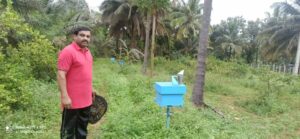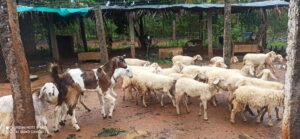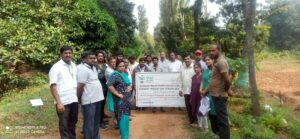I, N. Keshavamurthy, have originally come from a farming family. I was running a factory for 30 years, earning good income, but owing to labor problem, work stress and health issues, I got more inclined towards agriculture. I was very impressed by the ” ನೋಡಿ ತಿಳಿ ಮಾಡಿ ಕಲಿ” (“See and Know – Do and Learn” ), a training organised by Agricultural Science Center (KVK) Magadi. I realized that the reason for the deterioration of health is the method of growing food using fertilizers. I got interested in organic farming.
I started my farming life in three acres of land inherited from my father along with four acres of land which I bought. The farm had a barbed fencing, with a few trees of Silver Oak, Teak, Mahogany and two borewells. Realizing that a mix of short term, medium term, and long term crops can help in doubling the production, I adopted the “Forest Based Integrated Organic Farming” system.
Initially, a mix of grains was broadcasted on the field. To improve soil health, several practices like mulching and ploughing the biomass into soil etc., were followed. Initially I started getting income from the short-term crops such as beans, brinjal, pea, redgram, bhendi, tomato, green chillies, curcurbits crops and gourds. I also included medium term crops like lemon (100), Guava (50), Sapota (40), Amla (40), 30 plants each of Jackfruit, custard apple, green apple, Jamun, and 50 plants each of curry leaf , Black pepper, cardamom, Drumstick, were grown on my farm. Long term crops included silver oak (280), teak (120), mahogany (160), mango (100), coconut (180), banyan tree, neem tree, tamarind tree, Alangium tree sps, Ficus tree species, Bamboo tree and Sandalwood trees etc.

Bee keeping on the farm enhances biodiversity
Livestock has been a major component on my farm. The Livestock diversity includes : Hallikar Cows – 5, and Malenadu Gidda Cows -5, Sheep and Goats – 9, Poultry – 60( Turkey – 10, Chickens – 6, Fighter Chickens – 4, Khadak Nath Chickens – 10), Ducks – 9, Garden Guard Dogs – 4, and cats -4 etc.

Livestock is an integral part of farming
I have been following eco-friendly cultivation practices on my farm. Drip irrigation is used to conserve the limited water resources, compost and vermicompost are produced using the livestock and plant residues, which are further recycled onto the farm. Cattle dung is used to produce biogas, using biodigesters. Have also included bee keeping on my farm.
Moving towards a collective
With more farmer friends joining me in practising healthy and sustainable farming methods, we formed a 30 member group called “Sattva Organics”. We produced safe food and explored various markets like Farmers markets, selling in schools etc.
Moving forward, we formed a Farmer Producer Company – “Savandurga Raitha Uthpadaka Company Limited” with the support of Horticulture Department under a central government scheme on FPOs. Organisations like Small Farmers’ Business Federation, Paramparagata Krishi Vikasa Yojana (PKVY) in Ramanagara District Magadi Taluk, Sri Sri Rural Development Program Trust, Bangalore, also supported the initiative.
The main objectives of Raitha Uthpadaka Company was to enhance farmers incomes by imparting technical agricultural training and information to the farmers of coconut, mango and vegetable crops, by providing timely planting of seeds, use of fertilizers, organic biological medicines, access to market, encouraging value addition.
With awareness and trainings, farmers are now growing safe food, improved the soil fertility, reduced their crop production costs and enhanced the biodiversity.
We are also encouraging interested farmers to grow 10 crops that earn 10,000 per month. Intercropping in coconut tree has been done with the row like lemon, drumstick, curry leaf and cardamom. Income from sheep and goat rearing, cow calves, honey, fishing, earthworm composting, mango and value added products have helped in earning at least 60 thousand rupees.

Members of FPO campaigning for safe food production
The FPO is helping farmers through direct marketing system. Many marketing channels are being explored. For example, farmers produce is being marketed every Saturday at Poorna Pramati school premises in Girinagar and Purnapragya layout of Bangalore. Fruits and vegetables are sold directly to organic stores.
FPO is also helping farmers in producing value added products and selling them. Value-added products under the brand name “samagra siri” are being marketed. This includes malt made from cereals, pickles, honey, A2 milk, butter, ghee and organic chicken eggs.
Together with the forest campaign program, we are conducting a sapling planting program. Accordingly, every year 365 new plants, one plant per day is being added to our garden.
Overall, the initiative has helped in providing customers with fresh and non – toxic organic vegetables delivery at reasonable prices. By offering vegetables, value added products, we are providing “poison free food” to the society.
N. Keshavamurthy
S/o N. Nanjundayya
Ankanpalya, Motagondanahalli panchayat
Soluru Hobli, Magadi Taluk
Ramanagara District – 562127
E-mail : nkeshava42@gmail.com









